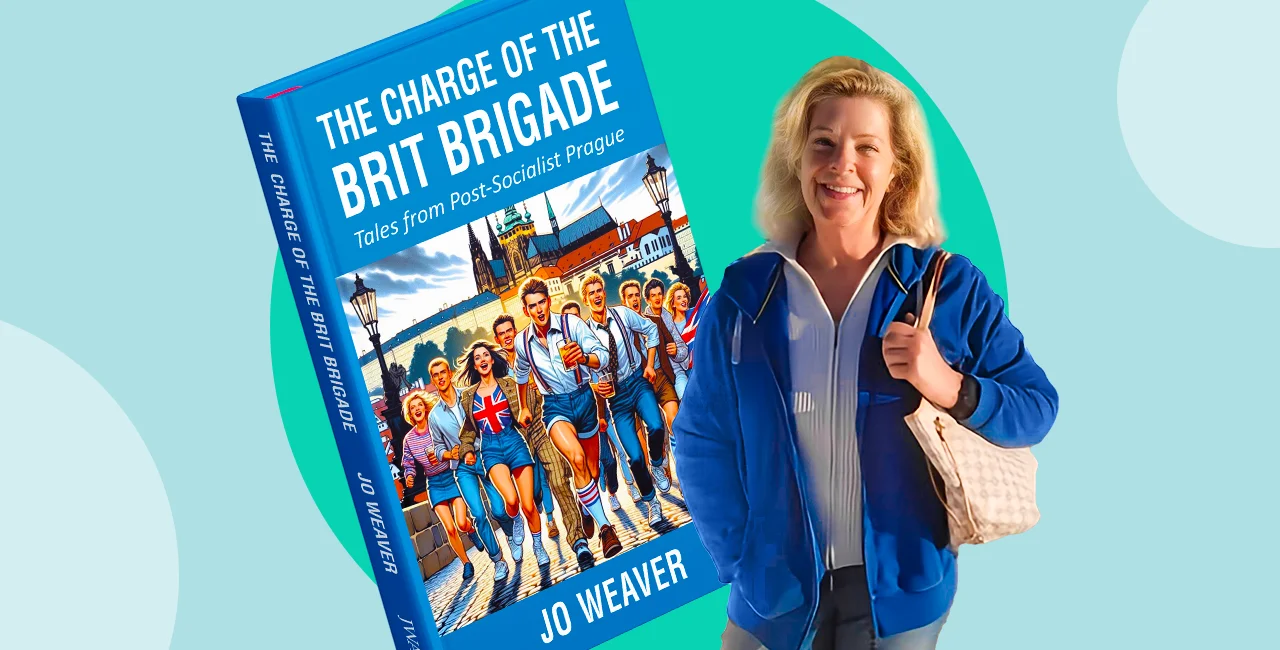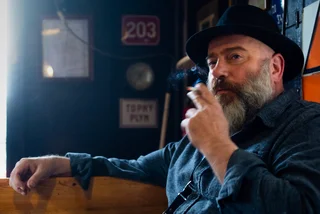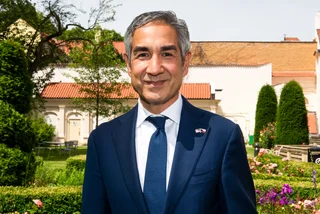From juicy business deals gone wrong to bonkers late-night partying and short-lived romances to connections made on the “flying pub” (also known as London-Prague weekend flights), a new book reveals what it was like being an expat in Prague before Erasmus, Duolingo, and Facebook meetups.
Published in May and now available on Amazon and elsewhere, businesswoman and author Jo Weaver’s The Charge of the Brit Brigade provides a sharp and colorful first-hand account of what it was like to live as a female English expat in the chaotic “Wild West” that was Prague right after the Velvet Revolution and the fall of communism.
Expats.cz caught up with Weaver to talk about her new book, an insightful account of how being an expat in Prague meant very different things then than it does today, although some similarities remain.
The interview has been edited for clarity and length.
You first came to Prague in December 1990, just a year after the Velvet Revolution toppled the communist regime in Czechoslovakia. How did you end up here?
I was working in corporate finance in London at the time. My company had recently opened an office in Prague, and somehow, somebody from human resources apparently knew my father was an Austrian Jew who later emigrated to England. Which is why they turned up at my door asking, “Wasn’t your family from around there?” This is a bit typical of the English mindset—and ignorance. Not knowing anything about Prague myself, I first came here for several weeks before Christmas 1990.
How did you like it?
I didn’t, at first. It was so cold, about minus 20 degrees the day I landed upon my arrival, and I’m much more of a hot- weather person. Those first few weeks were very difficult. I didn’t know anything about Prague, tourists and foreigners were just starting to come so there was barely any way to find support of any kind, and no one spoke English. It was almost impossible to get anything done, don’t forget there was no internet at that time, and the phone lines were scarce, barely worked and were usually shared, especially international ones – which we needed to use a lot given we had to phone London frequently.
Where were you staying?
At the InterContinental Hotel, which at the time was truly quite horrible, long before all the successive refurbishments and upgrades it has had since. The first thing I saw when I arrived was a “no guns allowed” sign at the entrance to the hotel. There were also a lot of prostitutes and drug-dealers working throughout the reception area.
Doesn’t really sound like love at first sight…
Our London office was very forward-thinking by deciding to open a branch in Prague, but at the end of my first three weeks, as I returned home for Christmas, I told everyone I would never go back. Coming from working in London, Prague really felt like the wild west, it gave me the feeling of having landed on the moon. To stay here you had to be a raving lunatic. But after my boss agreed to sweeten the terms of my contract, I eventually accepted, and was back in Prague.

Did it get any better?
I originally came back for an additional six months but continued to hate it. I worked more than I’d ever worked before, both because there was so much business to be done during this time, and because even the simplest tasks took much more time to get done. Communication was so difficult, we often had to wait until nighttime – when the telephone lines wouldn’t be overwhelmed and breaking down – to send the faxes we needed to get out.
Being one of the only expat women was also part of the reason why I struggled. We were all quite miserable, to tell the truth. The only free time we could have was usually in the middle of the night, and we drank as much as possible to cope with the next day.
What changed?
I met a young English guy one day at the airport carousel, who invited me out to meet with a few other expats living in Prague. The bar was this terrible Czech dive on the Old Town Square, the kind of pub where you couldn’t see anything as soon as you opened the door because of all the smoke, and which usually stayed open until four in the morning.
We were all crazy young kids who turned up in this country with so many opportunities, usually sent here by big companies, and we would discuss for hours in the pub about all the projects we should start and all kinds of new ventures to try. There was simply so much interest back then, so many deals to be made with foreign companies eyeing the Czech market, it’s hard to imagine how fast things could go. Suddenly, I wasn’t counting the days anymore, and at the end of my six months, I didn’t want to leave.
You soon became involved with the famous Pardubice horse race. How did that happen?
I’d always wanted to work in sports marketing, and was very much into tennis back in England, as well as horse-racing. Through connections, I was introduced to the people running the Velká pardubická race, which I used to watch as a child back home. At the time, the race was struggling, safety was hazardous, and a lot of horses died on the track.
Sponsors weren’t interested as they didn’t want to endorse the track because of all the bad press it was getting from animal rights activists and the public backlash. So, there I was, a young English girl who didn’t speak a word of Czech, starting to work with the organizers of the race to make it safer – I knew how it worked back home – and attract funding. This was my first foray into sports marketing and helped me to go at it alone and start my own marketing and PR firm.
Wasn’t it hard to go at it alone?
In general, the Czech sports world was tough to get into, especially for a foreigner, it was a very closed sector with vested solid interests and dominated by mafia groups, and I was told to back off quite a few times. But I also knew many people working for companies needing PR and marketing services, all companies eager to organize events to say: “we’re here.” That’s how I got sidetracked away from the sports world and into a lot more PR stuff and event management, which wasn’t really my plan.
But you stuck to it?
The first events were hard, and incredibly stressful. Getting meetings could still be very difficult, venues or musicians would cancel at the last minute, or simply not show up and we had no way of contacting them to find out where they were. We really had no life, working 18 hours a day and over weekends. But we kept meeting each other every night as much as possible, later in the original James Joyce pub, doing crazy things and hatching all sorts of crazy plans. What we all had in common, I think, was simply that we were barking mad.
You lived in Prague roughly until before Covid-19. Does your book cover all your time here?
That was the original plan, but in the end, this book ends around 1995. I’m now half-way into the second one. One of the reasons I wrote it was not necessarily only to talk about Prague itself, but as a tool and guide for anyone thinking of going abroad to work, or to move there for a year or two or even more, or to try to start a business, in order to show that it’s not all fun, exciting and exotic, but that there can also be a lot of struggles as well.












 Reading time: 6 minutes
Reading time: 6 minutes 



















